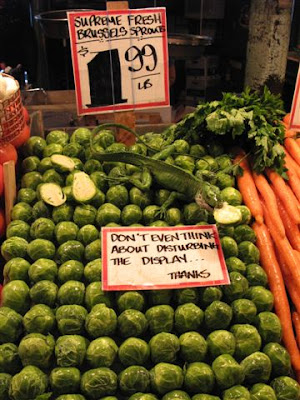
My frugality and fitness fanaticism are not mutually exclusive – in fact once you get past your Lululemon loving, living healthier saves you money in a lot of ways – but the one big health tip that everyone from Dr. Oz to Oprah to Jillian Michaels to PETA to Mark Sisson agree on is the one I have the hardest time following because it’s the one that hits me hardest in my (super cute zebra patterned) wallet. Yep, it’s the great organic quandary.
And yet, the organics crowd make some compelling points as to why this is so important. Many pesticides are known to interfere with hormones, high levels of which are found in almost every person of adult age today – even pesticides phased out of use 50 years ago still turn up in children because they are that omnipresent in our environment. Agribusiness will tell us that pesticides in small amounts are not harmful. Obviously if they were going to kill us we’d all be dead by now, right? Except that no human studies are done on pesticides (ethical review board: think, think….) and there is plenty of research after the fact to indicate that even very small doses of these chemicals can cause DNA damage for generations to come. In addition to messing with your metabolism (and possibly making you fat), organic farming is better for both local and global environments, is more sustainable and more “natural.” Many people even say that organic food tastes better.
But even if I do agree on principle with the evils of industrial food and food processing, the money is a very hard thing for me to get over. If I were single and living alone in a place where I have easy access to such food items, plenty of money to buy them and nobody to worry about but myself, like Jillian, then I’d have probably jumped on the wagon years ago. But. I live in the middle of suburban Minnesota with a husband and four children. The nearest Whole Foods is an hour away and when you go through 4 gallons of milk a week, the difference between $1.89 a gallon and $4.99 a gallon is $12.00. And that’s just milk.
The experts generally rebut: Consider it an investment in your health. Would you rather pay 2/3 more for groceries now or foot a thousand dollar bill for chemo and the possible loss of your life 10 years down the road?
My problem with that answer is that cancer – usually the scary disease called upon by people preaching clean eating – happens a lot. If you live past 60, you have a 50% chance of the disease. Sure lifestyle has something to do with it. But getting older in general has a lot to do with it as well. Sadly we can’t control the latter so we focus our efforts entirely on the former. Not that I’m saying living a clean lifestyle is bad, just that it’s not a lifetime warranty against cancer. I wish it was. Another issue I have with organics is that while you save the environment with one hand, your hurting with the other by having your organic grapes shipped in from Chile. One answer is to only eat what grows locally but the people who say that do not live in Minnesota, I guarantee it. Local eating is important but unless you live in a very abundant area with year-round production (Holla Cali and Florida!) then you will have to branch out. Especially if you want to “eat the rainbow” like experts so often tell us.
Another issue I have with organics is that while you save the environment with one hand, your hurting with the other by having your organic grapes shipped in from Chile. One answer is to only eat what grows locally but the people who say that do not live in Minnesota, I guarantee it. Local eating is important but unless you live in a very abundant area with year-round production (Holla Cali and Florida!) then you will have to branch out. Especially if you want to “eat the rainbow” like experts so often tell us.
In addition to the save-the-earth problem, another issue with organic food is that you often don’t know what you’re really getting. A friend who works seasonally at a local apple farm told me himself that they bring in all the apples from the orchard and put some in boxes for grocery stores labeled “regular apples” and some in boxes to be sold in higher end stores labeled “organic apples.” Same apples, different box. But rank dishonesty aside, the organic label isn’t a particularly stringent one and is often said to show the financial power of the grower rather than the method in which they grow their food as certifying organic is an apparently expensive process.
My last problem with organics is my silliest one, which is why I saved it for last. I did this. I went almost entirely organic (never did do the organic cotton sheets or clothing stuff) for about 6 months. I didn’t feel any different. I didn’t lose any weight. My skin didn’t seem clearer nor my hair bouncier nor any of the other things organics are supposed to do for you. Perhaps I didn’t give it enough time. Maybe 6 months wasn’t enough to overcome 30 years of sucking down pesticides, heavy metals and toxins like a poison slurpee. Perhaps by focusing on outward indicators I was missing the point. Or maybe it doesn’t make that much of a difference.
These days I buy grass-fed and finished cows and organic chickens but that’s only because the farmer I buy them from (Otis Farms, for any of you locals – they are amazing!!) gives me a sweet deal. I have to admit that I’ve mostly given up the organic quest for artificially greener pastures but every once in a while I’ll read something or talk to someone that makes me want to do it all over again. Is it worth the financial sacrifice? Would it have any noticeable effect? And even if it didn’t wouldn’t it still be worthwhile?
Help a confused former orthorexic out! What have you decided about organics? You in with both feet? Do you buys some things organic like milk but let others slide? Or do you not worry about organic but instead focus your shopping energies on avoiding preservatives, high fructose corn syrup and artificial flavors and colors? Anyone out there just buy whatever’s on sale?
 PS> Anyone ever tried a durian fruit?? I’ve heard they taste okay and are very nutritious but the smell is so rank it makes sulphur-scented car fresheners sound like a good idea.
PS> Anyone ever tried a durian fruit?? I’ve heard they taste okay and are very nutritious but the smell is so rank it makes sulphur-scented car fresheners sound like a good idea.
Written with love by Charlotte Hilton Andersen for The Great Fitness Experiment (c) 2011. If you enjoyed this, please check out my new book The Great Fitness Experiment: One Year of Trying Everythingfor more of my crazy antics and uncomfortable over-shares!